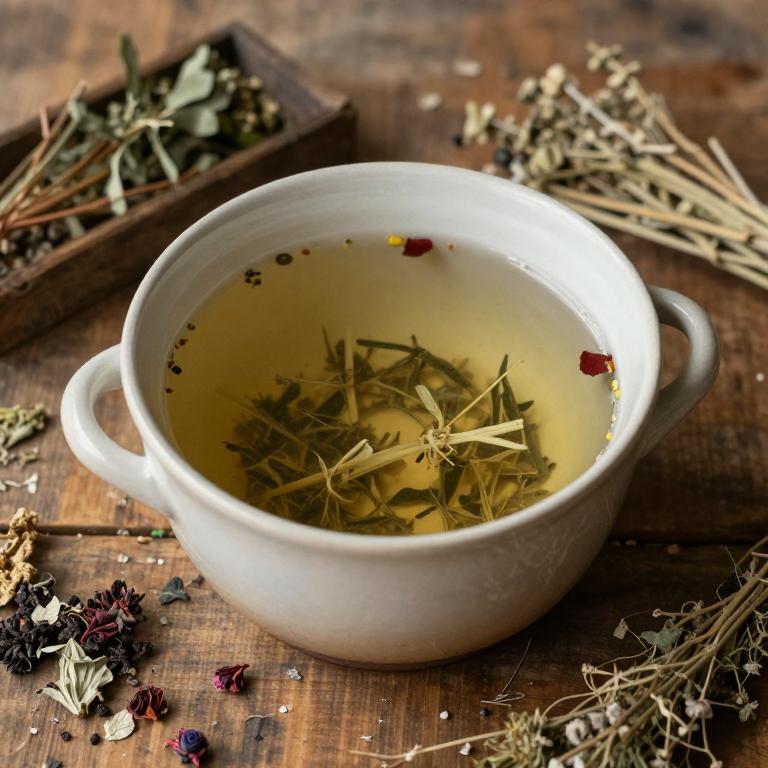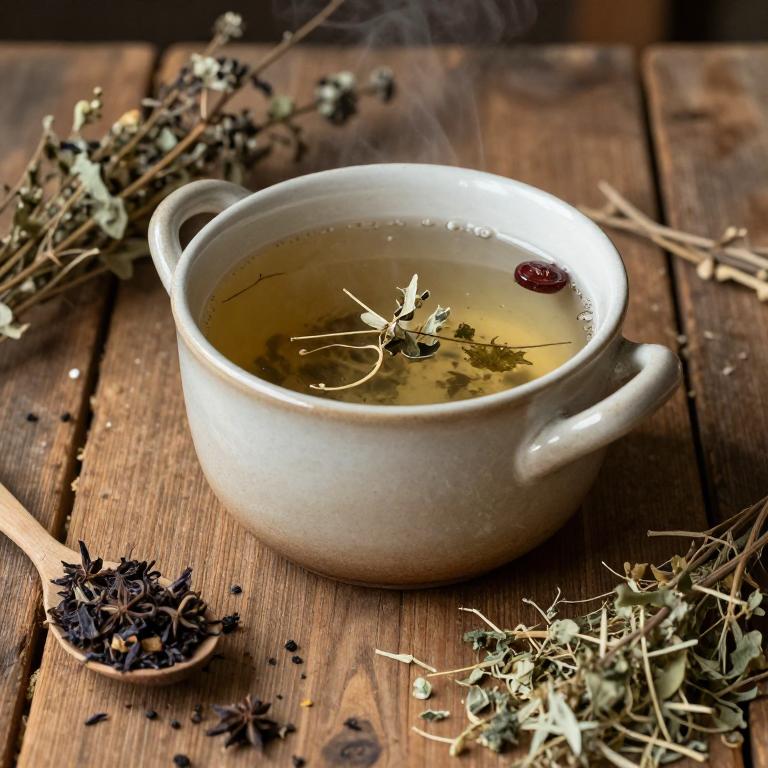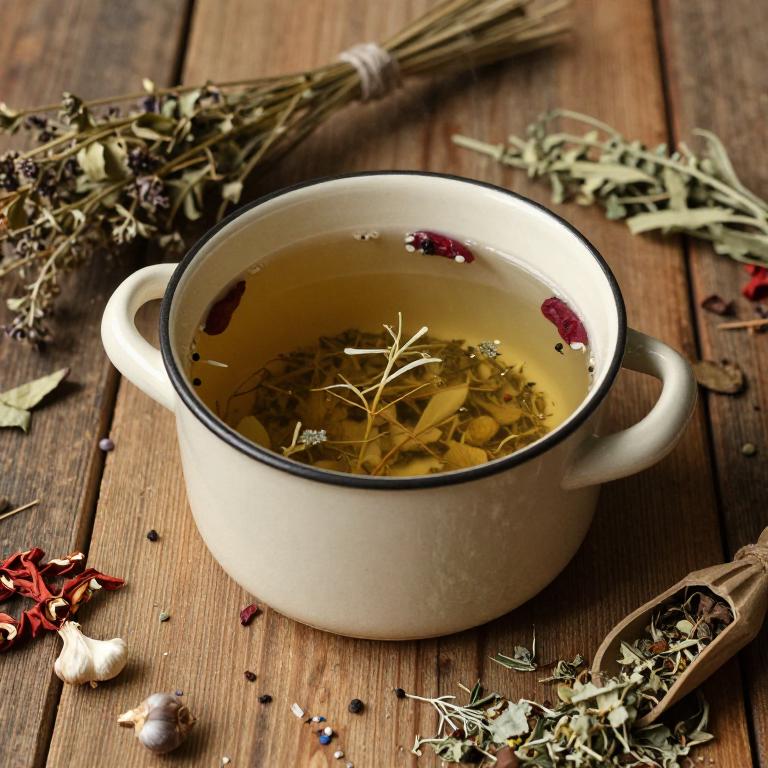10 Best Herbal Decoctions For Menstrual Cramps

Herbal decoctions have long been used to alleviate menstrual cramps by leveraging the anti-inflammatory and analgesic properties of various plants.
Commonly used herbs include ginger, chamomile, and cramp bark, which are believed to help relax uterine muscles and reduce pain. To prepare a decoction, these herbs are typically simmered in water for an extended period to extract their active compounds. This traditional method is often preferred for its natural approach and minimal side effects compared to pharmaceutical alternatives.
While herbal decoctions can provide relief, it is advisable to consult a healthcare provider before use, especially for those with underlying health conditions or taking other medications.
Table of Contents
- 1. Chaste tree (Vitex agnus-castus)
- 2. Turmeric (Curcuma longa)
- 3. Ginger (Zingiber officinale)
- 4. Dog rose (Rosa canina)
- 5. Black cohosh (Cimicifuga racemosa)
- 6. Salvia (Salvia officinalis)
- 7. Stinging nettle (Urtica dioica)
- 8. Chinese peony (Paeonia lactiflora)
- 9. Fennel (Foeniculum vulgare)
- 10. Chamomile (Matricaria chamomilla)
1. Chaste tree (Vitex agnus-castus)

Vitex agnus-castus, commonly known as chaste tree, has been traditionally used to support hormonal balance and alleviate symptoms associated with menstrual cramps.
Herbal decoctions made from the berries of the plant are often prepared by simmering the dried fruit in water for several minutes, then allowing it to steep. These decoctions are believed to influence the pituitary gland and regulate menstrual cycles, reducing cramp intensity and duration. Studies suggest that vitex may help reduce prostaglandin levels, which are linked to uterine contractions and pain.
As a natural remedy, vitex agnus-castus is typically used in conjunction with other herbs and under the guidance of a qualified herbalist or healthcare provider.
2. Turmeric (Curcuma longa)

Curcuma longa, commonly known as turmeric, has been traditionally used in herbal medicine for its anti-inflammatory and pain-relieving properties.
Herbal decoctions made from Curcuma longa involve boiling the rhizome in water to extract its active compounds, such as curcumin, which are believed to help alleviate menstrual cramps. These decoctions may reduce uterine inflammation and muscle spasms, providing natural relief for dysmenorrhea. Studies suggest that curcumin can inhibit the production of prostaglandins, which are responsible for uterine contractions and pain during menstruation.
However, it is important to consult a healthcare provider before using turmeric decoctions, especially for individuals with existing health conditions or those taking medications.
3. Ginger (Zingiber officinale)

Zingiber officinale, commonly known as ginger, has been widely used in traditional medicine for its therapeutic effects on menstrual cramps.
Herbal decoctions made from fresh or dried ginger root are often prepared by simmering the root in water to extract its active compounds, such as gingerol and shogaol. These compounds possess anti-inflammatory and analgesic properties that can help alleviate the pain and discomfort associated with dysmenorrhea. Studies suggest that ginger may help reduce the severity and duration of menstrual cramps by improving blood flow and reducing uterine contractions.
As a natural remedy, ginger decoctions are generally safe for most individuals, though they should be used with caution during pregnancy and in conjunction with medical advice when necessary.
4. Dog rose (Rosa canina)

Rosa canina, also known as rosehip, has been traditionally used in herbal medicine for its potential benefits in alleviating menstrual cramps.
The decoctions made from its dried fruits are rich in bioactive compounds such as flavonoids, vitamin C, and essential fatty acids, which may help reduce inflammation and muscle spasms. These properties can contribute to easing the pain and discomfort associated with dysmenorrhea. Rosa canina decoctions are often prepared by simmering the dried fruit in water for several minutes, allowing the active ingredients to be extracted.
While generally considered safe, it is advisable to consult a healthcare professional before using rosehip decoctions, especially for individuals with chronic conditions or those taking other medications.
5. Black cohosh (Cimicifuga racemosa)

Cimicifuga racemosa, commonly known as black cohosh, is a herbal remedy traditionally used to alleviate symptoms of menstrual cramps and other female reproductive health issues.
Herbal decoctions of Cimicifuga racemosa are prepared by simmering the dried root in water, allowing the active compounds to be extracted for consumption. This plant contains compounds such as triterpene glycosides and isoflavones, which are believed to have anti-inflammatory and analgesic properties that may help reduce menstrual pain. Studies suggest that Cimicifuga racemosa may act on the hypothalamic-pituitary-ovarian axis, potentially modulating hormonal imbalances that contribute to dysmenorrhea.
While it is often used as an alternative to conventional pain relief, it is important to consult a healthcare provider before using it, especially during pregnancy or with other medications.
6. Salvia (Salvia officinalis)

Salvia officinalis, commonly known as common sage, has been traditionally used for its potential benefits in alleviating menstrual cramps.
Herbal decoctions made from dried sage leaves are often prepared by simmering the leaves in water for several minutes to extract their active compounds. These decoctions are believed to possess antispasmodic and anti-inflammatory properties that may help reduce uterine contractions and pain associated with menstruation. Some studies suggest that the essential oils and flavonoids in sage may contribute to its efficacy in easing menstrual discomfort.
While more research is needed, many women find relief from menstrual cramps through the use of sage decoctions as a natural remedy.
7. Stinging nettle (Urtica dioica)

Urtica dioica, commonly known as stinging nettle, has been traditionally used in herbal medicine for its potential to alleviate menstrual cramps.
When prepared as a decoction, the leaves and stems of the plant are simmered to extract their beneficial compounds, including iron, silica, and various flavonoids. This herbal decoction is believed to help reduce inflammation and ease the pain associated with dysmenorrhea by supporting the body's natural healing processes. Some studies suggest that the high levels of antioxidants in stinging nettle may contribute to its effectiveness in menstrual pain relief.
However, it is important to consult with a healthcare provider before using urtica dioica, especially for individuals with existing health conditions or those taking medications.
8. Chinese peony (Paeonia lactiflora)

Paeonia lactiflora, commonly known as the peony, has been traditionally used in herbal medicine for its soothing properties, particularly for alleviating menstrual cramps.
Its roots contain compounds such as paeoniflorin, which possess anti-inflammatory and analgesic effects that may help reduce uterine spasms and pain during menstruation. Herbal decoctions made from Paeonia lactiflora are often prepared by simmering the dried roots in water for several hours to extract the active ingredients. These decoctions are typically consumed as a tea or taken in capsule form, and they are believed to support hormonal balance and ease menstrual discomfort.
While generally considered safe, it is advisable to consult a healthcare provider before using peony-based remedies, especially for individuals with existing medical conditions or those taking other medications.
9. Fennel (Foeniculum vulgare)

Foeniculum vulgare, commonly known as fennel, has been traditionally used in herbal medicine to alleviate menstrual cramps due to its antispasmodic and analgesic properties.
A fennel herbal decoction is typically prepared by boiling the dried seeds in water and allowing it to steep for several minutes before consumption. This preparation helps to relax uterine muscles and reduce the intensity of cramping associated with menstruation. The essential oils in fennel, such as anethol, are believed to contribute to its effectiveness in easing menstrual discomfort.
While generally considered safe, it is advisable to consult a healthcare provider before using fennel decoctions, especially for those with existing medical conditions or who are pregnant.
10. Chamomile (Matricaria chamomilla)

Matricaria chamomilla, commonly known as chamomile, is a widely used herbal remedy for alleviating menstrual cramps due to its mild sedative and anti-inflammatory properties.
Chamomile herbal decoctions, typically prepared by steeping the dried flowers in hot water, can help reduce uterine contractions and ease the discomfort associated with dysmenorrhea. The active compounds in chamomile, such as apigenin and flavonoids, contribute to its analgesic and muscle-relaxing effects, making it a popular choice for women experiencing painful menstruation. When consumed as a warm tea, chamomile decoctions may also promote relaxation and improve overall menstrual comfort.
However, it is advisable to consult a healthcare provider before using chamomile, especially for those with allergies or taking other medications.